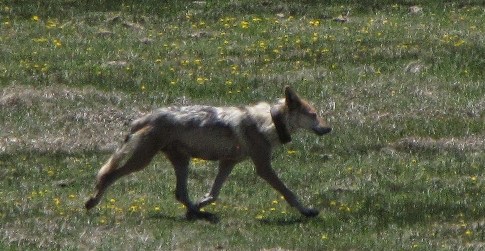13
Apr
Animal behavior expert: Cattle need to relearn predator defenses

A renowned animal sciences professor says wolves and coyotes shouldn’t be killed without reason, and ranchers should rekindle a cattle herd’s natural predator defense instincts.
Indiscriminate shooting or trapping of wolves and coyotes is a bad idea, and producers should strive for balance in the rangeland ecosystem, says Temple Grandin, the Colorado State University livestock handling and animal welfare expert.
“You may take out the wolf that is leaving the cattle alone,” Grandin said.
“The sensible thing to do is probably in between the rancher who says get rid of all the wolves and the environmentalist who says never take any wolves out,” Grandin said. “You want to take out the animal that’s developed a taste for lamb or beef.”
Grandin, whose insights on animal behavior caused livestock slaughterhouses to adopt calmer and more humane handling methods, expanded on points she made in a February article for Beef Magazine,
Among other things, Grandin believes ranchers can help cattle re-learn predator defense instincts such as bunching up instead of running.
The technique worked for the great bison herds that once roamed the plains, Grandin said. She credited the idea to two presenters at the Society for Range Management’s annual meeting in Sacramento this winter.
“Rekindling the natural herding instinct is not forcing the cattle together,” Grandin wrote in the magazine article. “The principle is to move back and forth in a straight line on the edge of the collective pressure zone” while not entering the herd’s “flight zone.”
Dealing with predators calls for a site-specific approach, Grandin said. “Something that works in one part of the country won’t work somewhere else.”
Grandin said wolves and coyotes usually avoid areas where people are present, and that employing range riders — as many Northeastern Oregon cattle ranchers do — is an effective deterrent. Removing livestock carcasses from grazing areas, a practice called for in Oregon’s wolf management plan, is critical to avoid attracting predators and giving them a taste for livestock, she said.
Individual packs favor specific prey, and “momma wolves” pass that on to their pups, she said.
A wolf pack that eats elk and leaves cattle alone should be tolerated, because it will protect its territory from packs that have other tastes, Grandin said.
“With coyotes, the one eating ground squirrels, you can shoot him — but he’s not the one bothering your livestock,” she said.
A better approach is to remove individual problem animals or a male and female pair that are caught in the act, she said.
“In managing these things, you have to look at the whole system,” Grandin said. “I do go on the premise that cattle are part of the system.”
People have impacted and managed rangeland for eons, dating back to when Native Americans burned grasslands, Grandin said. Critics of grazing don’t understand how human use of the range can be beneficial, she said.
“Responsible family ranchers are part of that system,” she said.
Grandin, who is autistic and has become an activist on that issue in addition to livestock management practices, is one of the few experts cited by both producers and conservation groups.
Her summary of the range management meeting was carried on the Defenders of Wildlife website. The American Farm Bureau Federation presented her the bureau’s Distinguished Service Award at its national convention in January.
This article was published in Capital Press.
_______________________________________________________________________________________________________
Click here to join our email list for Mexican gray wolf updates and action alerts.
Visit us on Facebook here.
Donate to support our work for Mexican gray wolf recovery here.
Photo credit: Jean Ossorio



